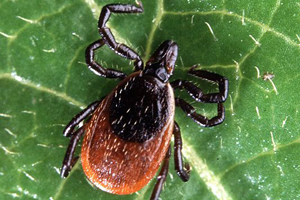Lyme Interview

Treatment for Lymes Disease needs to focus on
the infection
the resulting systemic inflammation
and the multi-system immune dysfunction that results
Chronic Lyme Treatment
•Eradicate pathogens
•Boost immunity
•Support affected organs/ systems
•Provide symptom relief
One of the areas of focus within Human Nature Natural Health is working with patients who are interested in a different approach to their acute or chronic Lyme disease care.
We sat down with Dr Bier to ask him about his interest and approach with patients working with a Chronic Lyme disease diagnosis.
When did you first start treating Lyme disease?
When I left the east coast to go to Medical School at Bastyr University in Seattle, Lyme disease was not really recognized yet as a clinical entity, and growing up in Montreal, it wasn’t something you ever heard or thought about - much too cold up there at the time for ticks. While I was in Washington State, the complex, difficult to diagnose diseases were ones like Rocky Mountain Spotted Fever. When I began my residency in Phoenix, AZ, and you had a patient with unexplained chronic symptoms, you looked for coccidioidomycosis, a desert fungal disease. In 1999, I moved back to the East Coast and Lyme disease was just beginning to be more commonly recognized, but I honestly didn't know much about it at the time.
What became clear as I began to see more patients with Lyme, was that the way I was trained - to work with the body and strengthen the immune system on its own - was not sufficient. On the other hand, just attacking Lyme like it was a bacterial or viral infection was not strong enough - I was consistently seeing people because the antibiotic route had failed them.
It led me to developing a more integrated approach to treating Lyme. Initially I just understood acute Lyme that was accepted by the conventional medical community. That thinkings evolved, but you still have two main camps right now- those people who do not believe in chronic Lyme at all and then you have those people who believe that everything is chronic Lyme, that any possible symptoms are those of chronic Lyme. I am somewhere in the middle; I have patients who clearly still have Lyme in their system and then I have other patients whose Lyme has resolved but aren’t feeling better because the damage from the Lyme itself, and the damage from the battle against the Lyme, remains.
Do you prescribe antibiotics to the Lyme patients you work with?
I do not prescribe antibiotics for a treatment approach for a number of reasons. I’m not against their use and many, if not most, of my Chronic Lyme patients have either used antibiotics in the past, or are still currently using them under the guidance of another practitioner. However they are not my specialty and I do not keep up on all the literature about them - I don’t believe in using something I am not an expert on.
Also quite frankly, I feel they are used far too casually by everybody, and antibiotics can be dangerous. There is a place for them, specifically to treat acute Lyme, if you are not a purist. My experience is that treating acute Lyme with the antibiotic within 24-48 hours of being bitten by the tick, before the infection gets deep within the system, the risk/benefit ratio is worthwhile at that time.
However, once you are past that acute window phase and in the chronic level of infection, the antibiotics often do not do what people want them to, or what some people claim they will do. The problem is that people get caught in the cycle of feeling somewhat better on the antibiotics, feeling worse when they are off the antibiotics, thereby feeling as though they need to go back on the antibiotics. Yet if they look at the their health over time, even if their neurological or joint symptoms get better, the trajectory of their overall health is continuing to go down, not up. The patient feels they need to continue the antibiotics to pull themselves back up, and yet, they’re still going deeper into illness and disharmony in their body. At that point, other practitioner often recommend they go to stronger antibiotics, or from taking antibiotics orally to intravenous dosage, and patients try to maintain themselves using stronger antibiotics while quite often continuing to feel worse and worse.
So how do you approach treating a patient with Lyme?
I look at Chronic Lyme as what we refer to as Lyme-MSIDS; Lyme-Multi System Infection, Inflammation, and Immune Deficiency Syndrome. Chronic Lyme patient don’t just have an infection, Lyme gets into multiple symptoms that include the infection, the inflammation that results from it, and the immune dysregulation. The only way to help someone get out of the Chronic Lyme cycle is to address all of those issues. The antibiotics, if at all, only address the infection, but don’t address the inflammatory and the immune dysregulation aspect.
My approach is more a comprehensive, multi-leveled plan. I use a battlefileld metaphor:even if the antibiotics are successful in winning the battle, the battle field, in this case the body, does not clean itself up. The bug itself and the battle that occurs with the antibiotic, causes damage across multiple systems. If you don't treat that damage, the patient never recovers.
I talk about the 3 B's - the bug, the biotic and the battle. With each Chronic Lyme patient, I have to see what Lyme has done to the system. The damage is still there after the antibiotics, so we have got to go in and repair the damage. Everything we do is based on what each unique individual needs so the damage really varies- in one person, the battle with the bug and the biotic causes damage in the neurological system, in another patient it may cause damage to the joints, or the gastrointestinal system. Using a multi system approach, I have to go in system by system and see what damage has been caused and what we need to do to repair it. The only way to know is to begin to repair the systems and see how the body responds, how it comes back online, whether the immune system begins to regulate appropriately, and how and where the inflammation resolves.
If you had one message to get out to people with Chronic Lyme disease about treatment, what would it be?
It is possible to heal and get your life back, but it is a long journey that requires a multifaceted approach targeting all the aspects of the chronic disorder. Antibiotics are a single shot approach, only targeting the infection, and giving antibiotics with probiotics is trying to mitigate the damage from the antibiotic, but it does not assist with the immune dysregulation and inflammation. It’s a much more complex issue.

Research Updates







